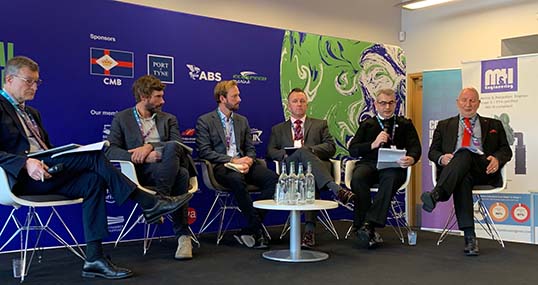
Seafarers have called on the UK government and industry to invest in the maritime workforce of the future with targeted, modern training in green technologies in order to reach environmental targets.
Second engineer Allan Dickson told the Maritime Skills Commission (MSC) Green Skills Forum at COP26 in Glasgow that there is a burning need for maritime professionals to receive training in environmentally friendly skills and technologies.
Mr Dickson, a Nautilus Champion, said the existing seafarer workforce must be brought along during the transition to net zero, and that the next generation of maritime professionals must be properly prepared during their cadetships.
'We need to look at how we retrain the existing workforce with the skills of the future, and don't just resign generations of highly skilled seafarers to the scrap heap,' he said.
Mr Dickson called on the government to develop policies to maximise the employment of British seafarers in the UK to avoid a repeat of the HGV crisis in the maritime sector. 'The impact would be even more profound if similar issues were to occur among seafarers,' he said.
Speaking on his own training experience, Mr Dickson noted the lack of training he received on new fuels and technologies. 'I must have had no more than an hour or two of training in battery power in the three-year cadetship. We did study gas fuel, but the technologies of the future that will help achieve net zero were entirely lacking.'
There is extra training available, however it is usually very expensive and doesn't cover the new hybrid systems that are being developed. 'The problem is, we're in a catch 22 situation now, because some of these new technologies that might get us to net zero, actually are so new that there's not many ships using them, and the training certainly hasn't caught up.
Nautilus would like to see a commitment from industry and from government to help fund the retraining of merchant navy officers who may miss out on these new skills because they went through their training before they were offered.
Other key asks include:
- Increase investment in the SMarT scheme to cover 100% of the cost of training UK-resident seafarers and require a commitment from employers to guarantee a period of employment on completion of a cadetship
- Ensuring British seafarers and maritime professionals are able to benefit from new job opportunities created in decommissioning of offshore oil rigs – an industry worth £48bn
- Better align cadet training and subsequent in-work training in new green technologies
- For a link to be made between government funding of maritime technology companies and training
Mr Dickson ended his speech referring to the Union's Build Back Fairer campaign: 'The government talks about levelling up and building back better. Well, let's build back fairer and ensure this investment comes with a commitment to good quality jobs for our highly skilled merchant navy workforce.'
Mr Dickson spoke on a panel alongside Professor Graham Baldwin, chair of the MSC; Dr Iain Percy, CEO Artemis Technologies; David Tyler, commercial director Artemis Technologies; Allan Ralston, director of energy and renewables, Harland and Wolff; Paul Wickes, CEO Cornwall Marine Network and Aurelie Nollet, Cornwall Marine Network.
The MSC is a strategic body formed by Maritime UK and the Department of Transport to future-proof training for seafarers. The findings from the forum will be turned into a recommendation paper to be shared early 2022.
Tags
More articles
Seafarers are on the frontline of climate change, hears ITF Sustainability Roundtable
The International Transport Workers' Federation (ITF) has launched its Sustainable Shipping Policy in an online webinar featuring panellists from the industry and seafarers themselves, including Nautilus Council member Captain Fraser Matthew.
IMarEST launches Resilient Ocean Film highlighting the importance of ocean preservation
Ahead of COP26, the Institute of Marine Engineering, Science and Technology (IMarEST) have released a short programme of films titled Resilient Ocean to highlight the importance of preserving the future health and resilience of our ocean resources through scientific advances.
International shipping and aviation are subject to the Paris Agreement, legal analysis concludes
A legal analysis of the Paris Agreement has concluded that emissions from international shipping and aviation are both covered by the treaty.
